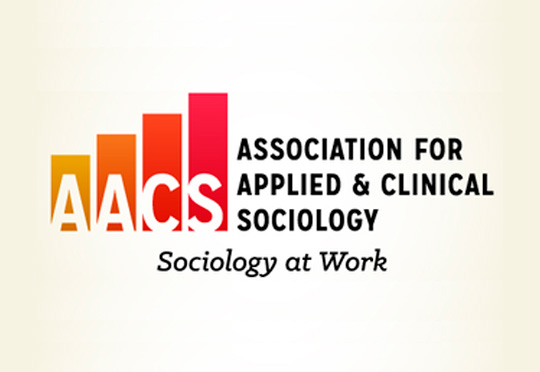The second weekend in October, a team of sociology students from Elizabethtown College took its second consecutive win at the Client Problem-Solving Competition at the Association for Applied and Clinical Sociology in Denver, Colorado. The team, sponsored by associate professor of sociology Michele Lee Kozimor-King and mentored by Barbara Prince ’12, triumphed over teams from Virginia Wesleyan College, University of Tampa, Midwestern State University, Oklahoma State University and a graduate program from the University of Northern Colorado.
Philip Ebersole and Caitlin Lockard, both Class of 2017, who were members of the winning team from 2016, were joined by two newcomers to the competition, Irene Snyder ’17 and Katie Thompson ’18. This strategy, Kozimor-King said, places returning competitors in a position of leadership as they are able to help the current team avoid previous mistakes.
The problem-solving competition is a research project to be completed in 48 hours. In order to create a level playing field, Kozimor-King said, the problem is not given to teams prior to their arrival at the competition. Each team conducts research to find a solution for the problem posed by the client, based in the literature. Upon completion, the team presents their findings to a panel. Their solution is judged upon several categories including its coverage of the question, integration of theory and methods, appropriateness of solutions, creativity, feasibility and the overall quality of the presentation.
It’s kind of amazing what, in 48 hours, a group of dedicated individuals can come up with.”
This year’s client was the African Community Center (ACC), a child organization of the Ethiopian Community Development Council. The ACC is a nonprofit organization, which helps to resettle refugees from various countries, but was encountering difficulty locating housing and landlords willing to help them. Because of stereotypes, Kozimor-King said, the landlords viewed refugee tenants as a risk. According to Kozimor-King, only one person from the ACC was working with the tenants and landlords for more than 500 refugee families.
“She was responsible for every single one of them, which…is pretty insane because how do you keep up with 581 people?” Thompson asked.
Though this is a competition, the nonprofit client participates because they need help and are hoping to receive a usable solution.
The goal of the E-town team, according to Kozimor-King, was “to provide a presentation that was professional and a concrete, short-term solution for the partner that they could use immediately.” Based on the literature, Kozimor-King said, the team felt stronger connections between the tenants and the existing landlords are needed in order to retain them.
“[You need to] put away individual wants and work as a cohesive unit for the client,” Ebersole said. “It’s not about winning, it’s about making a difference.”
Thompson said she enjoyed the challenge of the competition. Getting to know something well enough to give a presentation on it in 48 hours, Thompson said, was an interesting change from other presentations and school projects she had worked on for weeks in advance. She recommends this experience to anyone in the field.
“It’s kind of amazing what, in 48 hours, a group of dedicated individuals can come up with,” Kozimor-King said. She believes the competition is closely related to Elizabethtown’s signature learning experiences and fits perfectly with the College’s mission. “I’m an alum, so I’m trying to provide students with some of the experiences I’ve had. And I know real-world learning was a lot more powerful.” This competition allows students to apply skills they are learning in the classroom to a larger setting. “We are educate for service, and not just service as in volunteering, but meaningful life work,” Kozimor-King said.
The team’s solution established a mentoring program between landlords and refugees. Lockard, one of the student team mates, called colleges and universities in the Denver area to determine interest in a partnership with the ACC and in establishing an internship. To other team mates, Snyder and Thompson, traveled to meet with the client and speak to their housing coordinator. A key part of their solution, according to Kozimor-King, was connecting with a mediation agency willing to help with issues between landlords and refugees.
“They’re actually going to implement our solution,” Thompson said, “The fact that we can say that we helped a refugee resettlement agency in Denver, Colorado, from Elizabethtown is pretty huge.”
This year, the winning team received a $175 monetary prize in addition to a plaque and being featured on the Association for Applied and Clinical Sociology’s website. The team is still deciding how to use their winnings, but Kozimor-King said they want to help next year’s team and keep the tradition going.


